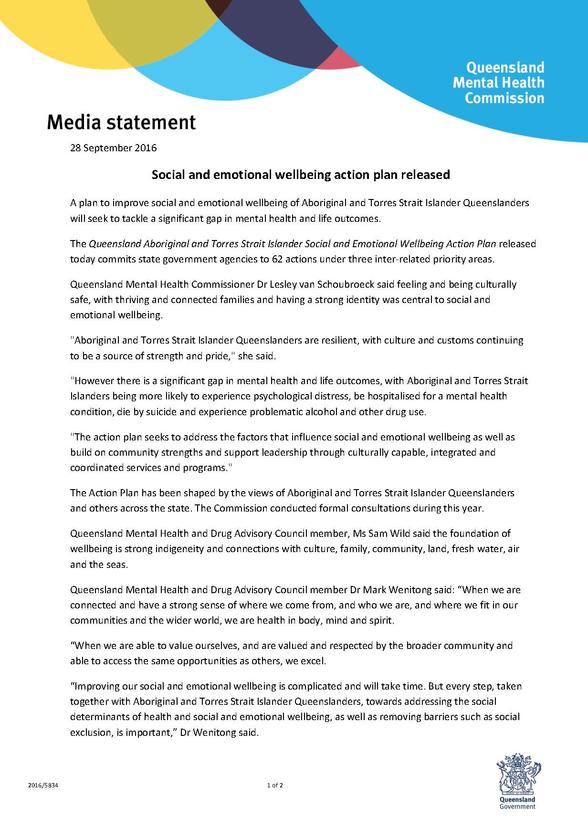A plan to improve social and emotional wellbeing of Aboriginal and Torres Strait Islander Queenslanders will seek to tackle a significant gap in mental health and life outcomes.
The Queensland Aboriginal and Torres Strait Islander Social and Emotional Wellbeing Action Plan released today commits state government agencies to 62 actions under three inter-related priority areas.
Queensland Mental Health Commissioner Dr Lesley van Schoubroeck said feeling and being culturally safe, with thriving and connected families and having a strong identity was central to social and emotional wellbeing.
"Aboriginal and Torres Strait Islander Queenslanders are resilient, with culture and customs continuing to be a source of strength and pride," she said.
"However there is a significant gap in mental health and life outcomes, with Aboriginal and Torres Strait Islanders being more likely to experience psychological distress, be hospitalised for a mental health condition, die by suicide and experience problematic alcohol and other drug use.
"The action plan seeks to address the factors that influence social and emotional wellbeing as well as build on community strengths and support leadership through culturally capable, integrated and coordinated services and programs."
The Action Plan has been shaped by the views of Aboriginal and Torres Strait Islander Queenslanders and others across the state. The Commission conducted formal consultations during this year.
Queensland Mental Health and Drug Advisory Council member, Ms Sam Wild said the foundation of wellbeing is strong indigeneity and connections with culture, family, community, land, fresh water, air and the seas.
Queensland Mental Health and Drug Advisory Council member Dr Mark Wenitong said: “When we are connected and have a strong sense of where we come from, and who we are, and where we fit in our communities and the wider world, we are health in body, mind and spirit.
“When we are able to value ourselves, and are valued and respected by the broader community and able to access the same opportunities as others, we excel.
“Improving our social and emotional wellbeing is complicated and will take time. But every step, taken together with Aboriginal and Torres Strait Islander Queenslanders, towards addressing the social determinants of health and social and emotional wellbeing, as well as removing barriers such as social exclusion, is important,” Dr Wenitong said.
Dr van Schoubroeck emphasised improving social and emotional wellbeing was important for all Queenslanders as it offers a protective factor against some mental illnesses, suicide and problematic alcohol and other drugs and supports recovery.
"Social and emotional wellbeing is influenced by the environment in which people live, play, learn and work," Dr van Schoubroeck said. "Racism and discrimination negatively impact the health, wellbeing and life outcomes of Aboriginal and Torres Strait Islander peoples.
"We heard from across the state that racism and discrimination has a profound influence on social and emotional wellbeing. Not only does it impact on an individual's ability to achieve their aspirations, it also influences their ability to access effective support and services."
Reduced life expectancy, higher rates of suicide and other factors such as the removal of children mean that Aboriginal and Torres Strait Islander people experience life events that lead to grief and trauma, on average, more frequently than other Queenslanders.
Dr van Schoubroeck said evidence pointed to the positive impacts of social and emotional wellbeing on the recovery of people living with a diagnosed mental illness, leading to reduced hospitalisation.
"To support improved social and emotional wellbeing, strategies need to be Indigenous-led, culturally capable and addressing local circumstances."
To read a full copy of the Queensland Aboriginal and Torres Strait Islander Social and Emotional Wellbeing Action Plan, go to Action Plan
-
 QMHC Indigenous social and emotional wellbeing action plan released (PDF, 272.66 KB)
QMHC Indigenous social and emotional wellbeing action plan released (PDF, 272.66 KB)

